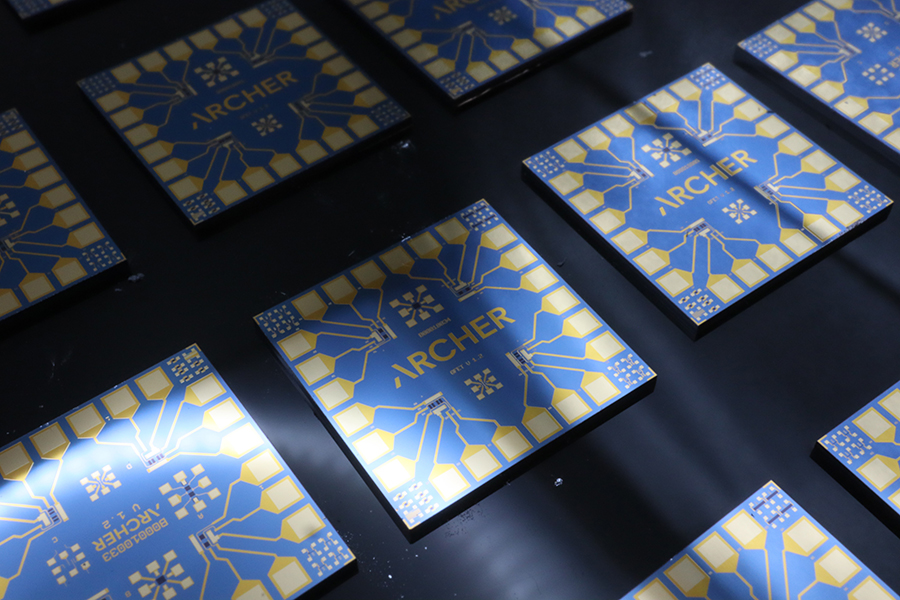Archer Materials – Australia’s quantum leap to the future

Company profile
Company Name: Archer Materials Limited
When started and by whom: 2007, Greg English
When listed: 2007
Market capitalisation: approx. A$150 million
Number of employees: 17 (15–20)
Sector: Manufacturing
Location: Sydney, NSW
Brief Profile: Qubit processor and biochip development.
Why R&D is needed
Quantum computing and advances in nanotechnology are quickly becoming a reality. Australian company Archer Materials Limited is at the international forefront of this revolution.
The company’s growth has been facilitated by the Research and Development Tax Incentive (R&DTI) to drive pioneering discoveries in the development of next-generation semiconductors.
CEO Dr Mohammad Choucair says recruiting internationally for leading scientists and technologists has been central to this.
How the R&D Tax Incentive has helped
For Archer Materials, the R&DTI has meant a significant tax offset that it reinvests in expanding the complex skill sets needed for its research.
By working with the Department of Industry, Science and Resources and the Australian Taxation Office through the R&DTI, we are able to amplify our investment in developing technologies.
Archer Materials describes itself as the only ASX-listed company developing the next generation of advanced semiconductor devices for quantum computing and medical diagnostics.
Its use of the R&DTI program has focused on developing its biochip and a quantum bit (qubit) processor: its 12CQ chip. The qubit chip uses a unique carbon nanomaterial that could enable quantum computing in modern electronics.
The 12CQ chip would give devices such as smartphones and computers "truly amazing” new capabilities, says Dr Choucair.
"The end-uses can impact almost every sector that is dependent on computational power. The chip is the paradigm shift.”
Leveraging research service providers
The company’s research into quantum technologies and the development of a qubit processor is intensely complex. It is supported by extensive relationships the company has built with a range of research service providers.
"We’re fortunate to be working with, for example, the University of Sydney, which has a research and prototyping foundry and analytical facilities," explains Dr Choucair.
The company can access these facilities with its own staff, but that independence doesn’t come cheap. Through the R&DTI program, it is able to claim back a significant part of the costs involved.
This, in turn, helps Archer to maintain its research capabilities and expand its team.
"This is crucial because the research we are doing requires rare skill sets: nanotechnologists, physicists, chemists, biologists, theoreticians, materials scientists and foundry and fabrication engineers,” Dr Choucair says.
"Our ability to work with these research providers means we can work in Australia and lead the way in the quantum space.”
R&D as a pillar for Australian businesses
Dr Choucair identified the need for R&D early on. He explained that for Archer, he could see R&D was where its value-add and value-capture would come from.
"In identifying R&D as a key strategic pillar, it was natural to engage with the R&DTI program as a long-term plan. If one of your significant cost centres is R&D, then you need to learn about the R&DTI.”
Dr Choucair believes the program also encourages a structured approach to R&D, record-keeping, controls and processes.
"It requires you to be meticulous … which is great. We are technologists and best practice record-keeping is part of our code of conduct.”
"The R&DTI application process fits into how we already operate and encourages us to keep looking for ways to improve.”
In effect, Dr Choucair sees the R&DTI and its processes as a credibility pillar. "Being able to back up your work with years of R&D is crucial. You need momentum, and that R&DTI reinvestment helps to maintain this.”
A passion for discovery continues to drive Dr Choucair in his role at Archer Materials. "Our research has the potential to help solve many of the world’s challenges and have a positive impact on the lives of millions of people. I believe that is a genuinely noble endeavour.”
We use cookies to give you a better experience on our website. Learn more about how we use cookies and how you can select your preferences.